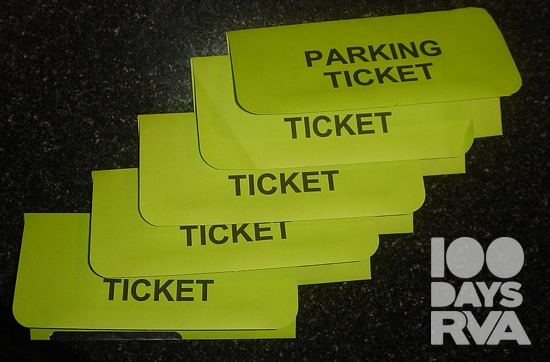Day #026: Variable fines for crimes
What incentives does Bill Gates have not to speed?

Inspired by Michael Bierut’s 100 Day Project, 100 Days to a Better RVA strives to introduce and investigate unique ideas to improving the city of Richmond. View the entire project here and the intro here.
- Idea: Fines for crimes that adjust based on income and wealth.
- Difficulty: 4 — Altering laws is tough. Altering justice is near impossible.
Fines, probation, and incarceration are the prices we pay for breaking the laws of society. Time in prison or on probation is time in prison or on probation, but fines have a sliding scale of impact.
An individual who earns minimum wage could be devastated by a parking ticket, but a wealthy individual might only be inconvenienced by the paperwork and think nothing of the cost. At the end of the day, both individuals are equally guilty.
The economist Gary Becker did plenty of rich research into crime in the 1960’s. If we make the assumption that criminals are rational, 1 then Becker suggests that criminals decide to commit a crime if the following, simple equation is true:
Benefit – (Probability of punishment * Cost of punishment) > 0
This seems like a reasonable equation. The benefit of speeding is low but the probability of being caught and the cost of being caught are both relatively low. For someone in distress, murder may seem very beneficial, but the probability of being caught and the cost of being caught are very high.
If society deems a behavior unacceptable and establishes a deterrent, then that deterrent (the cost of punishment in the above equation) should be identical for every member of society. People with more wealth or higher incomes have lower marginal values of the dollar. This means they value each additional dollar of punishment less than people with less income or wealth. One way to correct for this in Richmond would be to link penalty guidelines to wealth or income.
Under this system, breaking a local law would warrant up to a fixed amount of time in jail and/or a fine equal to a formula based on annual income and wealth. For example: the maximum punishment for a first degree misdemeanor would be three months in jail and/or a fine equal to 0.5% of wealth plus 1% of annualized income.
This system would be successful provided two important assumptions. First, that fines don’t generate revenue for the city. Incentives work both ways; the incentives to pull over Bill Gates or Warren Buffett in order to generate revenue would be too powerful. Cities could adopt a similar fine systems as the NFL where the money goes to a third party. Second, that there’s a minimum fine for crimes. Being unemployed and in debt would not give you free reign to park anywhere in Richmond without fear of punishment.
Everyone’s heard the popular stories: the kid who got away with killing four people because of “affluenza,” the business man who got away with his seventh DUI because his role as a boss is too important to his employees. The wealthy are clearly equally capable of letting down society. It’s time that we give them less of an incentive to do so.
Love this idea? Think it’s terrible? Have one that’s ten times better? Head over to the 100 Days to a Better RVA Facebook page and join in the conversation.
Photo by: karimiaz
- This is a big assumption when viewing the entire realm of criminals, but it’s necessary and policy isn’t really equipped to handle the irrational. ↩
-
Recommend this
on Facebook -

Report an error
-

Subscribe to our
Weekly Digest





Notice: Comments that are not conducive to an interesting and thoughtful conversation may be removed at the editor’s discretion.